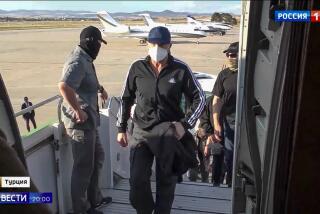Dissident, Spy Swap Rumored : German Paper Says Sakharov Is Part of Four-Nation Deal
- Share via
BONN — Soviet dissidents Andrei Sakharov and Anatoly Shcharansky may be released in a spy and dissident exchange being organized by the Soviet Union, the United States and East and West Germany, Bild newspaper said today.
In Geneva, officials awaited the expected arrival on an exit visa of Sakharov’s wife, Yelena Bonner, for eye surgery in the West. Bonner failed to appear on the first of two flights out of Moscow today, lending credence to suggestions that she may refuse to leave the Soviet Union without her husband.
Bild today announced that its Friday editions will carry a story saying Sakharov and Shcharansky are the central figures in an exchange being arranged by the superpowers and the two Germanies. A similar forecast was published by Der Spiegel magazine earlier this month.
Bild based its report on unnamed Washington and Bonn diplomatic sources.
Bild said complex, four-sided negotiations were under way for an exchange to take place in late November, sometime after the Nov. 19-20 Geneva summit between President Reagan and Soviet leader Mikhail S. Gorbachev.
“Moscow and Washington, as well as Bonn and East Berlin, are all negotiating at the same time in this matter,” Bild said.
Imprisoned Soviet Spies
Bild, which was the first to report the granting of Bonner’s exit visa, said the United States had declared itself ready to release an unspecified number of Soviet spies sentenced to long U.S. prison terms.
In return, the Soviets would allow Sakharov, winner of the 1975 Nobel Peace Prize, to leave for the West along with Shcharansky, a 37-year-old computer expert and prominent Soviet Jewish dissident, the paper said.
Sakharov was banished to internal exile in the Soviet city of Gorky in January, 1980, after criticizing the Soviet invasion of Afghanistan. Shcharansky was sentenced in 1978 to three years in prison followed by 10 years in a labor camp for alleged “anti-Soviet” propaganda and “espionage.”
In the reported deal, as many as 12 British, West German and American agents could be released by the Soviets, while East Germany was offering to free as many as 10 imprisoned West German spies.
More to Read
Sign up for Essential California
The most important California stories and recommendations in your inbox every morning.
You may occasionally receive promotional content from the Los Angeles Times.













